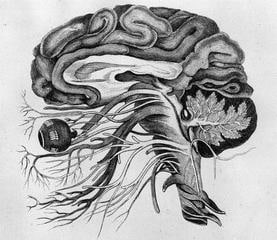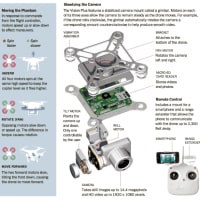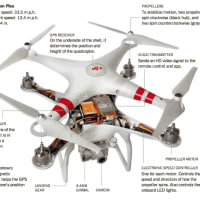Addiction Is Not A Disease Of The Brain 中毒は脳の病気ではない
著者は哲学者である。哲学は考えることであり、知識ではない。たとえば心は何処にあるかについて、科学は答えることはできない。中毒の定義や病気の定義或いは正常と異常の定義を共有しないと、この議論は結論が出ない気がする。哲学者は考え続ければいいが、因果関係を究明し結論を導きださなければならない科学者とは土俵が違う。
Categories: Science and Philosophy
September 9, 2011
by Alva Noë

Hulton Archive/Getty Images
Addiction has been moralized, medicalized, politicized, and criminalized. And, of course, many of us are addicts, have been addicts or have been close to addicts. Addiction runs very hot as a theme.
中毒患者はときに道徳で語られ、医学や政治問題になり、犯罪にもなる。 そしてもちろん、我々の多くも何らかの中毒にかかっている、中毒であったり、中毒がかっていたりする。中毒はテーマとして熱く語られる。
Part of what makes addiction so compelling is that it forms a kind of conceptual/political crossroads for thinking about human nature. After all, to make sense of addiction we need to make sense of what it is to be an agent who acts, with values, in the face of consequences, under pressure, with compulsion, out of need and desire. One needs a whole philosophy to understand addiction.
中毒を語らずにいられなくする要因のひとつは、それが人間の本質について考えるときに概念的なものと、分別的なものの交差点のようなものを形成しているからだ。 結局、中毒に意味を持たせるためには、我々は、欲求や必要性から強いられ、あるプレッシャーのもとでのそれらの行為の結果を前にして、そのように作用する因子に価値のある何かの意味づけをする必要がある。 人は中毒を理解するには哲学の全体を必要とする。
Today I want to respond to readers who were outraged by my willingness even to question whether addiction is a disease of the brain.
Let us first ask: what makes something — a substance or an activity — addictive? Is there a property shared by all the things to which we can get addicted?
Unlikely. Addictive substances such as alcohol, heroin and nicotine are chemically distinct. Moreover, activities such as gambling, eating, sex — activities that are widely believed to be addictive — have no ingredients.
今日は、私は、中毒は脳の病気の一つだろうかと敢えて問おうとする私の態度に怒っている読者に反論しようと思う。
まず最初に問う: 何が“あるもの”を・・・つまり物質や活動を・・・・中毒にするのか? 全てのことに共通する何か、それによって中毒になる何かがあるのか?
アルコールや、ヘロイン、ニコチンのような中毒物質は化学的に明白である。 とりわけ、ギャンブル、過食・偏食、セックス・・のような行為も広く中毒と考えられているが・・これには要因物質は無い。
And yet it is remarkable — as Gene Heyman notes in his excellent book on addiction — that there are only 20 or so distinct activities and substances that produce addiction. There must be something in virtue of which these things, and these things alone, give rise to the distinctive pattern of use and abuse in the face of the medical, personal and legal perils that we know can stem from addiction.
そして、さらに驚くことには・・・・ジーン・ハイマンが彼の中毒に関する名著に記しているように・・・中毒を生み出す明確な活動や物質は僅か20やそこらであるという。
我々が中毒に起因すると思う医学上、個人上そして法律上の危険を前にして、明白な使用パターンや乱用が引き起こされるとするのは、これらの要因によって、これらの要因のみによってとするのは、なかなかのことだ。
What do gambling, sex, heroin and cocaine — and the other things that can addict us — have in common?
One strategy is to look not to the substances and activities themselves, but to the effects that they produce in addicts. And here neuroscience has delivered important insights.
何がギャンブル、セックス、ヘロインそしてコカインをさせるのか・・・・そして他のものが我々を中毒にすることができるのか・・・何か共通のものがあるのか?
一つの戦略は物質や活動自身に目を向けるのではなく、中毒患者のなかで、それらが生み出す影響に注目することだ。 ここに脳神経科学が非常に重要な洞察を提示している。
If you feed an electrical wire through a rat's skull and onto to a short dopamine release circuit that connects the VTA (ventral tegmental area) and the nucleus accumbens, and if you attach that wire to a lever-press, the rat will self-stimulate — press the lever to produce the increase in dopamine — and it will do so basically foreover, forgoing food, sex, water and exercise. Addiction, it would seem, is produced by direct action on the brain!
もし、あなたが電気のコードをネズミの頭蓋骨を通してドーパミンを分泌する短絡経路(これは中脳側頭被蓋野と側坐核に繋がっている。)につなぎ、それをレバー押器に接続して、ネズミが自分で刺激をできるようにすると・・・レバーを推せばドーパミンを沢山出すことが出来る・・・・・ネズミは基本的に、餌も、生殖も水も運動もそっちのけでレバーを押し続ける。 中毒は脳の直接的な働きで引き起こされているように見える。
(See here for a useful Wikipedia review of this literature.)
http://en.wikipedia.org/wiki/Brain_stimulation_reward
And indeed, there is now a substantial body of evidence supporting the claim that all drugs or activities of abuse (as we can call them), have precisely this kind of effect on this dopamine neurochemical circuit.
そして、事実、そこには、全てのドラッグや乱用の行為は正にこの種の脳神経回路のドーパミンの影響であると主張する、実体としての証拠がある。
When the American Society of Addiction Medicine recently declared addiction to be a brain disease their conclusion was based on findings like this. Addiction is an effect brought about in a neurochemical circuit in the brain. If true, this is important, for it means that if you want to treat addiction, you need to find ways to act on this neural substrate.
アメリカの中毒医薬協会が最近中毒は脳の病気であると発表したとき、彼らのこの結論はこのような発見に基づいたものであった。 即ち、中毒は脳内の神経化学回路にもたらされた影響によるものである。 もしそれが真実ならば、これは重要である、なぜなら、中毒を治療したければ、この神経物質に働きかける方法を見つける必要があるからだ。
All the rest — the actual gambling or drug taking, the highs and lows, the stealing, lying and covering up, the indifference to work and incompetence in the workplace, the self-loathing and anxiety about getting high, or getting discovered, or about trying to stop, and the loss of friends and family, the life stories and personal and social pressures — all these are merely symptoms of the underlying neurological disease.
それ以外の全て・・・即ち実際のギャンブル、ドラッグ飲用、気分の浮き沈み、盗み、虚言癖や隠蔽、仕事への無関心や無能力、自己嫌悪やハイになる心配、見つかったり、止められたりする恐怖、友人や家族の喪失、人生の営みや個人、社会のプレッシャー・・・・これら全てが単に脳神経疾病が元となる症状ということになる。
But not so fast. Conside:
All addictive drugs and activities elevate the dopamine release system. Such activation, we may say, is a necessary condition of addiction. But it is very doubtful that it is sufficient. Neuroscientists refer to the system in question as the "reward-reinforcement pathway" precisely because all rewarding activities, including nonaddictive ones like reading the comics on sunday morning or fixing the leaky pipe in the basement, modulate its activity. Elevated activity in the reward-reinforcement pathway is a normal concomitant of healthy, nonaddictive, engaged life.
全ての中毒性のドラッグや活動はドーパミンの分泌システムを高めている。 そのような活性化が中毒の症状には必要ということになる。しかし、それで十分だとするのは非常に疑問だ。脳神経科学者は、その問題のシステムを「報酬強化回路」(特定行為をすると快感物質が出て、それを繰り返すループ回路)として言及している。正確には全ての報酬を得る行為は非中毒性(日曜日の朝に漫画を読んだり、地下の水漏れ配管を修理したりを含む)のものも全てその行動を調節している。報酬強化回路で高められた活動は、正常な同時に見られる健康的なもので、中毒ではなく、忙しい生活といえる。
Neuroscientists like to say that addictive drugs and activities, but not the nonaddictive ones, "highjack" the reward-reinforcement pathway, they don't merely activate it. This is the real upshot of the rat example. The rat preferred lever-pressing to everything; it dis-valued everything in comparison with lever-pressing. And not because of the intrinsic value of lever-pressing, but because of the link artificially established between the lever-pressing and the dopamine release.
脳神経学者は非中毒ではなく、中毒ドラッグや活動が報酬強化回路を「ハイジャック」(一時借用)し、単にそれを活性化しなかっただけと言うだろう。 これはネズミの例の本当の結論だ。 ネズミはレバーを押すことを全てに優先させた;つまりネズミはレバーを押すことに比べて他の全ての行為を低い価値と見なしたのである。 そして、それはレバーを押すことの本質的な価値ゆえにではなく、レバーを押す行為とドーパミンを分泌する反応の間に人工的に構築されたリンクのせいである。
If this is right, then we haven't discovered, in the reward reinforcement system, a neurochemical signature of addiction. We haven't discovered the place where addiction happens in the brain. After all, the so-called highjacking of the reward system is not itself a neurochemical process; it is a process whereby neurochemical events get entrained within in a larger pattern of action and decision making.
もし、これが正しいとするならば、我々は、報酬強化システムの中に神経化学物質の中毒の兆候を見つけていないということになる。 我々は脳のどこで中毒が起こるのか見つけていないことになる。 そうなると、結局、いうところの報酬システムのハイジャックはそれ自体が脳神経化学のプロセスではないということ;すなわち、それはより大きな行動パターンと意思決定の中で、内に混入した神経化学事象によるプロセスである。
Is addiction a disease of the brain? That's a bit like saying that eating is a phenomenon of the stomach. The stomach is an important part of the story. But don't forget the mouth, the intestines, the blood, and don't forget the hunger, and also the whole socially-sustained practice of producing, shopping for and cooking food.
中毒は脳の疾病だろうか? それは食べることが胃の現象だというのに少し似ている。 もちろん胃はその場合重要な役を演じてはいるが、口や、腸や、血液を忘れてはいけない、そして空腹感も忘れてはいけない、そして全体として社会を維持する、生産や購入や調理なども同様だ。
And so with addiction. The neural events in VTA clearly belong to the underlying mechanisms of addiction. They are necessary, but not sufficient; they are only part of the story.
中毒についても同じことが言える、VTA(中脳腹側被蓋野)の神経の現象は明らかに中毒のメカニズム根底部分に属しているが、それは必要な現象であって、それは十分(それが全て)条件ではない、その現象は全体の一部に過ぎないのだ。
Remember: normally there is a dynamic quality to our actions and preferences, just as there is with those of rats. We enjoy exercising, but we soon get tired or bored. But rest, too, soon loses its appeal. We eat, and then we are sated. And then we are ready for the tread mill again. And so on. Things have gradually changing and complementary values. In addiction, this dynamic goes rigid. The addicts goal assumes a fixed value, and the value of everything shrinks to zero, and with terrible costs.
思い出してほしい、通常我々の行動や選好(好み)には、ネズミのそれと同様に動的機能の本質がある。 私たちは運動を楽しむが、暫くすると疲れたり飽きたりする。しかし、休息はまた、それらの気持ちを消す。 私たちは食べる、そして食べ飽きる。そしてランニングマシンをまた走る気持ちになる。 などなど・・物事は徐々に変化し、相互に補完するような価値をもっている。 中毒では、この動的機能が固着してしまう。中毒の結末は、他の全ての価値がゼロにして、大変な犠牲を払って、固定価値を引き受けることだ。
Our strategy was to look for systematic effects that all and only the addictive drugs and activities have on addicts. And we've found what we were looking for. The effects are behavioral and experiential. The things that addict us all produce a very distinctive breakdown in the organization of our preferences, actions and choices.
我々の戦略は全て及び中毒性ドラッグや活動だけが中毒患者に及ぼすシステマティックな影響を探求することだった。 そして、我々は探していたものを見つけた。 その影響は行動的なものであり、経験的なものである。 我々を中毒にする物は全て、選好や行動や選択の働きに非常にあきらかな機能障害をもたらす。
Is addiction a disease of the brain? This strikes me as a dubious falsification of what is, really, a phenomenon that can only be understood in terms of the life, choices, needs and understanding of the whole person.
中毒は脳の病気だろうか? これは、本当は、生活、選択、要求そして全人格の理解という文脈でのみ理解されうる現象の怪しい偽の説のように思えるのだ。
Next week: an extended discussion of Gene Heyman's Addiction: A Disorder of Choice.
以下は上記寄稿に対する支持の多いコメントの上位5名です。いずれも反論のコメントでした。 科学者或いは有識者からの反論が大変多かったのが特徴です。なかなか辛辣なコメントです。
Erica Melief (eefie83) wrote:
As a neuroscientist who has studied addiction, I found this article to be painfully oversimplified. Dopamine is a key chemical in mediating the acquisition of an addiction, but it is not the end of the story. Glutamate, GABA, serotonin, norepinephrine all play a role, and all modulate each other (I do hope that that Wikipedia article wasn't your only reference).
中毒を研究してきた脳神経科学者として、私はこの記事があまりにも中毒というものを単純化してとらえていると思いました。 ドーパミンは中毒になる橋渡しをするカギとなる化学物質ですが、それで全て説明がつくものではありません。 グルタミン酸塩、ガンマアミノ酸酪塩、セロトニン、ノルエピネフェリン等全てが働きをして、相互に調節します。(念を押しますが、ウィキペディアだけを参照にしないでください。)
Additionally, every person's brain is different. It's not a random chance that some people become addicted to substances or experiences easily while others are relatively resistant. Everyone's brain is wired differently, and every time a neuron fires, that neuron changes. Proteins are added, receptors are inserted into cell membranes (or removed), ion flow is altered. Repeated drug use changes the way the brain responds to the drug. Our reward system was evolved to reinforce pleasurable things that contributed to survival and propagation (calorie dense food and sex, for example), so stimulation of it produces a feedforward effect that is very hard to break.
更に、各人の脳は個別性があります。 他の人が比較的抵抗力があるのに、ある人達が物質に中毒になったり、容易に囚われ易かったりするのは偶然ではありません。各人の脳はそれぞれ異なった配線(伝達回路)をもっており、いつもニューロンが発火して変化しています。 プロテインが加わり、レセプター(受容体)が細胞膜に入ったり、出たりします、またイオンの流れも変化します。 ドラッグの繰り返しの飲用がドラッグに対する脳の反応の仕方を変えます。私たちの報酬システムは、生存や繁殖に寄与する心地よいことを強化するように進化しました。(例えば高カロリー食事やセックスなどです。)、ですからその刺激はフィードフォワード(正方向送り)効果を生み、それはとても強固なものです。
Taking a drug in the first place is a choice. What happens in the brain to reinforce the effects of that drug, and thus the drive to acquire more, is not.
ドラッグを最初に飲用するのは選択の問題です。 そのドラッグの影響を強化するために脳内で起こることは更に得ようする衝動であり、選択の問題ではありません。
2011年9月9日 14:31:50
Recommend (92)
Pop Culture (Human1st) wrote:
You let us know when this article has been subjected to peer review and published in a major journal, ok?
この記事が専門家の評価を受けたのか、そして権威ある専門誌に掲載されたのかをまず私たちに知らせるべきです。
One of the purposes of peer review is to allow the assumptions underlying one's argument to be analyzed by others with similar specialized knowledge. One of the problems of articles like this is that it is presented to laypeople who lack the education in the particular field needed to reasonably discuss and challenge them. More, the author's position as a writer for a science blog creates an air of authority that makes the average reader inclined to accept his/her position.
専門家の評価の一つの目的は、その人の議論の基となる仮定が同様な専門家の知見によって分析されていることを認めることです。 このような記事の問題点の一つは、それが、ちゃんとした議論や質疑が必要な特定の分野の知識を欠いた素人の人々に提供されることです。 更にサイエンスブログのライターとしての著者の地位が一種の権威の空気を生み、それが、その記事にたいして、一般の読者を信じやすくさせることです。
If it's not in a journal, it's junk.
その記事がちゃんとした専門誌に載ってないとしたら、それは俗説に過ぎません。
2011年9月10日 19:52:08
Recommend (65)
Paul McCaffrey (PaulMc) wrote:
I'm an addictions counselor, with an academic background in neuroscience. I don't follow this author's reasoning, at all. Scientists have found a neural substrate for addiction. That doesn't diminish the psychological and social aspects of the problem.
私は脳神経化学の学術面の知識をもった中毒のカウンセラーですが、私はこの著者の理由付けを全く支持しません。 科学者は中毒の神経物質を見つけましたが、それらは、中毒の心理的そして社会的側面を狭くするものではないのです。
2011年9月10日 18:03:32
Recommend (50)
Tedd Speck (Tedd_S) wrote:
Alva, I think you're out of your area of expertise here. While addiction does need to be looked at holistically, brain chemistry is extremely complex and I don't feel you are in any position to make the judgement that addiction is not a disease of the brain. Your first two paragraphs are good, and there is need for a philosophical viewpoint on it. But I think this is a job for a neuro-scientist with training in philosophy, and not the other way around.
アルバさん、私は貴方はこの分野の門外漢だと思います。 中毒は包括的に見る必要があります。脳内化学は非常に複雑なものであり、あなたは中毒は脳の病気ではないと結論を下す、どのような立場にもないと私は思います。 あなたの記事の最初の二つのパラグラフは良しとします、確かにそれには哲学的な視点が必要です。しかし、これは、哲学の知見も備えた脳神経学者の仕事です、その逆はありません。(脳神経の知見を持った哲学者の仕事ではない。)
2011年9月9日 15:22:50
Recommend (39)
M G (Marisag) wrote:
You're about 20 years behind on the research, Alva. Leave Dr. Heyman in the past, where he belongs. He's one of the researchers that cannot let go of the idea that addiction is all about dopamine. Behavioral Neuroscientists started moving away from that point of view long ago, this old-fashioned thinking by Dr. Heyman is underscored by the fact that he hasn't been funded by the NIH in over 5 years and even then he had only one grant for his research...I wouldn't call it 'extensive' or 'stellar' by any means. There is so MUCH better neuroscience on addictions out there than this quack. You sound so terribly self-rightious and quite frankly, ill-informed by taking one 'denier's' position over the entire body of neurobiology, behaviorists, neuropsychopharmacology, etc. that is out there and shows overwhelming evidence that addiction is, in fact, a disease. Are you a creationist too?
アルバさん、あなたは、その研究に20年も遅れていますよ。 ハイマン博士が帰属している過去の遺物から立ち去ることです。 彼は、中毒は全てドーパミンからくるという考えを捨てきれない研究者の一人なのですよ。 行動脳神経科学者はとうの昔に、その見方から遠く離れて進んでいます。このハイマン博士の古い考え方が受け入れられていないということは国立衛生研究所(NIH)が5年もの間研究費を助成してないという事実でも明らかです。との当時でさえ彼の研究に補助金を出したのは一か所です。 私は彼の研究を広範で素晴らしいとはどうしても言えません。 このイカサマ説より、まだまだ素晴らしい中毒についての脳神経科学が沢山あります。 あなたの意見はとても独善的に聞こえます、もっと率直に申せば、脳神経学、行動学、神経精神薬理学等々いまここにあり、中毒は事実病気だという圧倒的な証拠を示している学会全体の理論に否定的な立場をとる一人の誤った意見を鵜呑みにしています。 あなたも新学説の創造者ですか?
2011年9月9日 16:44:33
Recommend (36)
著者は哲学者である。哲学は考えることであり、知識ではない。たとえば心は何処にあるかについて、科学は答えることはできない。中毒の定義や病気の定義或いは正常と異常の定義を共有しないと、この議論は結論が出ない気がする。哲学者は考え続ければいいが、因果関係を究明し結論を導きださなければならない科学者とは土俵が違う。
Categories: Science and Philosophy
September 9, 2011
by Alva Noë

Hulton Archive/Getty Images
Addiction has been moralized, medicalized, politicized, and criminalized. And, of course, many of us are addicts, have been addicts or have been close to addicts. Addiction runs very hot as a theme.
中毒患者はときに道徳で語られ、医学や政治問題になり、犯罪にもなる。 そしてもちろん、我々の多くも何らかの中毒にかかっている、中毒であったり、中毒がかっていたりする。中毒はテーマとして熱く語られる。
Part of what makes addiction so compelling is that it forms a kind of conceptual/political crossroads for thinking about human nature. After all, to make sense of addiction we need to make sense of what it is to be an agent who acts, with values, in the face of consequences, under pressure, with compulsion, out of need and desire. One needs a whole philosophy to understand addiction.
中毒を語らずにいられなくする要因のひとつは、それが人間の本質について考えるときに概念的なものと、分別的なものの交差点のようなものを形成しているからだ。 結局、中毒に意味を持たせるためには、我々は、欲求や必要性から強いられ、あるプレッシャーのもとでのそれらの行為の結果を前にして、そのように作用する因子に価値のある何かの意味づけをする必要がある。 人は中毒を理解するには哲学の全体を必要とする。
Today I want to respond to readers who were outraged by my willingness even to question whether addiction is a disease of the brain.
Let us first ask: what makes something — a substance or an activity — addictive? Is there a property shared by all the things to which we can get addicted?
Unlikely. Addictive substances such as alcohol, heroin and nicotine are chemically distinct. Moreover, activities such as gambling, eating, sex — activities that are widely believed to be addictive — have no ingredients.
今日は、私は、中毒は脳の病気の一つだろうかと敢えて問おうとする私の態度に怒っている読者に反論しようと思う。
まず最初に問う: 何が“あるもの”を・・・つまり物質や活動を・・・・中毒にするのか? 全てのことに共通する何か、それによって中毒になる何かがあるのか?
アルコールや、ヘロイン、ニコチンのような中毒物質は化学的に明白である。 とりわけ、ギャンブル、過食・偏食、セックス・・のような行為も広く中毒と考えられているが・・これには要因物質は無い。
And yet it is remarkable — as Gene Heyman notes in his excellent book on addiction — that there are only 20 or so distinct activities and substances that produce addiction. There must be something in virtue of which these things, and these things alone, give rise to the distinctive pattern of use and abuse in the face of the medical, personal and legal perils that we know can stem from addiction.
そして、さらに驚くことには・・・・ジーン・ハイマンが彼の中毒に関する名著に記しているように・・・中毒を生み出す明確な活動や物質は僅か20やそこらであるという。
我々が中毒に起因すると思う医学上、個人上そして法律上の危険を前にして、明白な使用パターンや乱用が引き起こされるとするのは、これらの要因によって、これらの要因のみによってとするのは、なかなかのことだ。
What do gambling, sex, heroin and cocaine — and the other things that can addict us — have in common?
One strategy is to look not to the substances and activities themselves, but to the effects that they produce in addicts. And here neuroscience has delivered important insights.
何がギャンブル、セックス、ヘロインそしてコカインをさせるのか・・・・そして他のものが我々を中毒にすることができるのか・・・何か共通のものがあるのか?
一つの戦略は物質や活動自身に目を向けるのではなく、中毒患者のなかで、それらが生み出す影響に注目することだ。 ここに脳神経科学が非常に重要な洞察を提示している。
If you feed an electrical wire through a rat's skull and onto to a short dopamine release circuit that connects the VTA (ventral tegmental area) and the nucleus accumbens, and if you attach that wire to a lever-press, the rat will self-stimulate — press the lever to produce the increase in dopamine — and it will do so basically foreover, forgoing food, sex, water and exercise. Addiction, it would seem, is produced by direct action on the brain!
もし、あなたが電気のコードをネズミの頭蓋骨を通してドーパミンを分泌する短絡経路(これは中脳側頭被蓋野と側坐核に繋がっている。)につなぎ、それをレバー押器に接続して、ネズミが自分で刺激をできるようにすると・・・レバーを推せばドーパミンを沢山出すことが出来る・・・・・ネズミは基本的に、餌も、生殖も水も運動もそっちのけでレバーを押し続ける。 中毒は脳の直接的な働きで引き起こされているように見える。
(See here for a useful Wikipedia review of this literature.)
http://en.wikipedia.org/wiki/Brain_stimulation_reward
And indeed, there is now a substantial body of evidence supporting the claim that all drugs or activities of abuse (as we can call them), have precisely this kind of effect on this dopamine neurochemical circuit.
そして、事実、そこには、全てのドラッグや乱用の行為は正にこの種の脳神経回路のドーパミンの影響であると主張する、実体としての証拠がある。
When the American Society of Addiction Medicine recently declared addiction to be a brain disease their conclusion was based on findings like this. Addiction is an effect brought about in a neurochemical circuit in the brain. If true, this is important, for it means that if you want to treat addiction, you need to find ways to act on this neural substrate.
アメリカの中毒医薬協会が最近中毒は脳の病気であると発表したとき、彼らのこの結論はこのような発見に基づいたものであった。 即ち、中毒は脳内の神経化学回路にもたらされた影響によるものである。 もしそれが真実ならば、これは重要である、なぜなら、中毒を治療したければ、この神経物質に働きかける方法を見つける必要があるからだ。
All the rest — the actual gambling or drug taking, the highs and lows, the stealing, lying and covering up, the indifference to work and incompetence in the workplace, the self-loathing and anxiety about getting high, or getting discovered, or about trying to stop, and the loss of friends and family, the life stories and personal and social pressures — all these are merely symptoms of the underlying neurological disease.
それ以外の全て・・・即ち実際のギャンブル、ドラッグ飲用、気分の浮き沈み、盗み、虚言癖や隠蔽、仕事への無関心や無能力、自己嫌悪やハイになる心配、見つかったり、止められたりする恐怖、友人や家族の喪失、人生の営みや個人、社会のプレッシャー・・・・これら全てが単に脳神経疾病が元となる症状ということになる。
But not so fast. Conside:
All addictive drugs and activities elevate the dopamine release system. Such activation, we may say, is a necessary condition of addiction. But it is very doubtful that it is sufficient. Neuroscientists refer to the system in question as the "reward-reinforcement pathway" precisely because all rewarding activities, including nonaddictive ones like reading the comics on sunday morning or fixing the leaky pipe in the basement, modulate its activity. Elevated activity in the reward-reinforcement pathway is a normal concomitant of healthy, nonaddictive, engaged life.
全ての中毒性のドラッグや活動はドーパミンの分泌システムを高めている。 そのような活性化が中毒の症状には必要ということになる。しかし、それで十分だとするのは非常に疑問だ。脳神経科学者は、その問題のシステムを「報酬強化回路」(特定行為をすると快感物質が出て、それを繰り返すループ回路)として言及している。正確には全ての報酬を得る行為は非中毒性(日曜日の朝に漫画を読んだり、地下の水漏れ配管を修理したりを含む)のものも全てその行動を調節している。報酬強化回路で高められた活動は、正常な同時に見られる健康的なもので、中毒ではなく、忙しい生活といえる。
Neuroscientists like to say that addictive drugs and activities, but not the nonaddictive ones, "highjack" the reward-reinforcement pathway, they don't merely activate it. This is the real upshot of the rat example. The rat preferred lever-pressing to everything; it dis-valued everything in comparison with lever-pressing. And not because of the intrinsic value of lever-pressing, but because of the link artificially established between the lever-pressing and the dopamine release.
脳神経学者は非中毒ではなく、中毒ドラッグや活動が報酬強化回路を「ハイジャック」(一時借用)し、単にそれを活性化しなかっただけと言うだろう。 これはネズミの例の本当の結論だ。 ネズミはレバーを押すことを全てに優先させた;つまりネズミはレバーを押すことに比べて他の全ての行為を低い価値と見なしたのである。 そして、それはレバーを押すことの本質的な価値ゆえにではなく、レバーを押す行為とドーパミンを分泌する反応の間に人工的に構築されたリンクのせいである。
If this is right, then we haven't discovered, in the reward reinforcement system, a neurochemical signature of addiction. We haven't discovered the place where addiction happens in the brain. After all, the so-called highjacking of the reward system is not itself a neurochemical process; it is a process whereby neurochemical events get entrained within in a larger pattern of action and decision making.
もし、これが正しいとするならば、我々は、報酬強化システムの中に神経化学物質の中毒の兆候を見つけていないということになる。 我々は脳のどこで中毒が起こるのか見つけていないことになる。 そうなると、結局、いうところの報酬システムのハイジャックはそれ自体が脳神経化学のプロセスではないということ;すなわち、それはより大きな行動パターンと意思決定の中で、内に混入した神経化学事象によるプロセスである。
Is addiction a disease of the brain? That's a bit like saying that eating is a phenomenon of the stomach. The stomach is an important part of the story. But don't forget the mouth, the intestines, the blood, and don't forget the hunger, and also the whole socially-sustained practice of producing, shopping for and cooking food.
中毒は脳の疾病だろうか? それは食べることが胃の現象だというのに少し似ている。 もちろん胃はその場合重要な役を演じてはいるが、口や、腸や、血液を忘れてはいけない、そして空腹感も忘れてはいけない、そして全体として社会を維持する、生産や購入や調理なども同様だ。
And so with addiction. The neural events in VTA clearly belong to the underlying mechanisms of addiction. They are necessary, but not sufficient; they are only part of the story.
中毒についても同じことが言える、VTA(中脳腹側被蓋野)の神経の現象は明らかに中毒のメカニズム根底部分に属しているが、それは必要な現象であって、それは十分(それが全て)条件ではない、その現象は全体の一部に過ぎないのだ。
Remember: normally there is a dynamic quality to our actions and preferences, just as there is with those of rats. We enjoy exercising, but we soon get tired or bored. But rest, too, soon loses its appeal. We eat, and then we are sated. And then we are ready for the tread mill again. And so on. Things have gradually changing and complementary values. In addiction, this dynamic goes rigid. The addicts goal assumes a fixed value, and the value of everything shrinks to zero, and with terrible costs.
思い出してほしい、通常我々の行動や選好(好み)には、ネズミのそれと同様に動的機能の本質がある。 私たちは運動を楽しむが、暫くすると疲れたり飽きたりする。しかし、休息はまた、それらの気持ちを消す。 私たちは食べる、そして食べ飽きる。そしてランニングマシンをまた走る気持ちになる。 などなど・・物事は徐々に変化し、相互に補完するような価値をもっている。 中毒では、この動的機能が固着してしまう。中毒の結末は、他の全ての価値がゼロにして、大変な犠牲を払って、固定価値を引き受けることだ。
Our strategy was to look for systematic effects that all and only the addictive drugs and activities have on addicts. And we've found what we were looking for. The effects are behavioral and experiential. The things that addict us all produce a very distinctive breakdown in the organization of our preferences, actions and choices.
我々の戦略は全て及び中毒性ドラッグや活動だけが中毒患者に及ぼすシステマティックな影響を探求することだった。 そして、我々は探していたものを見つけた。 その影響は行動的なものであり、経験的なものである。 我々を中毒にする物は全て、選好や行動や選択の働きに非常にあきらかな機能障害をもたらす。
Is addiction a disease of the brain? This strikes me as a dubious falsification of what is, really, a phenomenon that can only be understood in terms of the life, choices, needs and understanding of the whole person.
中毒は脳の病気だろうか? これは、本当は、生活、選択、要求そして全人格の理解という文脈でのみ理解されうる現象の怪しい偽の説のように思えるのだ。
Next week: an extended discussion of Gene Heyman's Addiction: A Disorder of Choice.
以下は上記寄稿に対する支持の多いコメントの上位5名です。いずれも反論のコメントでした。 科学者或いは有識者からの反論が大変多かったのが特徴です。なかなか辛辣なコメントです。
Erica Melief (eefie83) wrote:
As a neuroscientist who has studied addiction, I found this article to be painfully oversimplified. Dopamine is a key chemical in mediating the acquisition of an addiction, but it is not the end of the story. Glutamate, GABA, serotonin, norepinephrine all play a role, and all modulate each other (I do hope that that Wikipedia article wasn't your only reference).
中毒を研究してきた脳神経科学者として、私はこの記事があまりにも中毒というものを単純化してとらえていると思いました。 ドーパミンは中毒になる橋渡しをするカギとなる化学物質ですが、それで全て説明がつくものではありません。 グルタミン酸塩、ガンマアミノ酸酪塩、セロトニン、ノルエピネフェリン等全てが働きをして、相互に調節します。(念を押しますが、ウィキペディアだけを参照にしないでください。)
Additionally, every person's brain is different. It's not a random chance that some people become addicted to substances or experiences easily while others are relatively resistant. Everyone's brain is wired differently, and every time a neuron fires, that neuron changes. Proteins are added, receptors are inserted into cell membranes (or removed), ion flow is altered. Repeated drug use changes the way the brain responds to the drug. Our reward system was evolved to reinforce pleasurable things that contributed to survival and propagation (calorie dense food and sex, for example), so stimulation of it produces a feedforward effect that is very hard to break.
更に、各人の脳は個別性があります。 他の人が比較的抵抗力があるのに、ある人達が物質に中毒になったり、容易に囚われ易かったりするのは偶然ではありません。各人の脳はそれぞれ異なった配線(伝達回路)をもっており、いつもニューロンが発火して変化しています。 プロテインが加わり、レセプター(受容体)が細胞膜に入ったり、出たりします、またイオンの流れも変化します。 ドラッグの繰り返しの飲用がドラッグに対する脳の反応の仕方を変えます。私たちの報酬システムは、生存や繁殖に寄与する心地よいことを強化するように進化しました。(例えば高カロリー食事やセックスなどです。)、ですからその刺激はフィードフォワード(正方向送り)効果を生み、それはとても強固なものです。
Taking a drug in the first place is a choice. What happens in the brain to reinforce the effects of that drug, and thus the drive to acquire more, is not.
ドラッグを最初に飲用するのは選択の問題です。 そのドラッグの影響を強化するために脳内で起こることは更に得ようする衝動であり、選択の問題ではありません。
2011年9月9日 14:31:50
Recommend (92)
Pop Culture (Human1st) wrote:
You let us know when this article has been subjected to peer review and published in a major journal, ok?
この記事が専門家の評価を受けたのか、そして権威ある専門誌に掲載されたのかをまず私たちに知らせるべきです。
One of the purposes of peer review is to allow the assumptions underlying one's argument to be analyzed by others with similar specialized knowledge. One of the problems of articles like this is that it is presented to laypeople who lack the education in the particular field needed to reasonably discuss and challenge them. More, the author's position as a writer for a science blog creates an air of authority that makes the average reader inclined to accept his/her position.
専門家の評価の一つの目的は、その人の議論の基となる仮定が同様な専門家の知見によって分析されていることを認めることです。 このような記事の問題点の一つは、それが、ちゃんとした議論や質疑が必要な特定の分野の知識を欠いた素人の人々に提供されることです。 更にサイエンスブログのライターとしての著者の地位が一種の権威の空気を生み、それが、その記事にたいして、一般の読者を信じやすくさせることです。
If it's not in a journal, it's junk.
その記事がちゃんとした専門誌に載ってないとしたら、それは俗説に過ぎません。
2011年9月10日 19:52:08
Recommend (65)
Paul McCaffrey (PaulMc) wrote:
I'm an addictions counselor, with an academic background in neuroscience. I don't follow this author's reasoning, at all. Scientists have found a neural substrate for addiction. That doesn't diminish the psychological and social aspects of the problem.
私は脳神経化学の学術面の知識をもった中毒のカウンセラーですが、私はこの著者の理由付けを全く支持しません。 科学者は中毒の神経物質を見つけましたが、それらは、中毒の心理的そして社会的側面を狭くするものではないのです。
2011年9月10日 18:03:32
Recommend (50)
Tedd Speck (Tedd_S) wrote:
Alva, I think you're out of your area of expertise here. While addiction does need to be looked at holistically, brain chemistry is extremely complex and I don't feel you are in any position to make the judgement that addiction is not a disease of the brain. Your first two paragraphs are good, and there is need for a philosophical viewpoint on it. But I think this is a job for a neuro-scientist with training in philosophy, and not the other way around.
アルバさん、私は貴方はこの分野の門外漢だと思います。 中毒は包括的に見る必要があります。脳内化学は非常に複雑なものであり、あなたは中毒は脳の病気ではないと結論を下す、どのような立場にもないと私は思います。 あなたの記事の最初の二つのパラグラフは良しとします、確かにそれには哲学的な視点が必要です。しかし、これは、哲学の知見も備えた脳神経学者の仕事です、その逆はありません。(脳神経の知見を持った哲学者の仕事ではない。)
2011年9月9日 15:22:50
Recommend (39)
M G (Marisag) wrote:
You're about 20 years behind on the research, Alva. Leave Dr. Heyman in the past, where he belongs. He's one of the researchers that cannot let go of the idea that addiction is all about dopamine. Behavioral Neuroscientists started moving away from that point of view long ago, this old-fashioned thinking by Dr. Heyman is underscored by the fact that he hasn't been funded by the NIH in over 5 years and even then he had only one grant for his research...I wouldn't call it 'extensive' or 'stellar' by any means. There is so MUCH better neuroscience on addictions out there than this quack. You sound so terribly self-rightious and quite frankly, ill-informed by taking one 'denier's' position over the entire body of neurobiology, behaviorists, neuropsychopharmacology, etc. that is out there and shows overwhelming evidence that addiction is, in fact, a disease. Are you a creationist too?
アルバさん、あなたは、その研究に20年も遅れていますよ。 ハイマン博士が帰属している過去の遺物から立ち去ることです。 彼は、中毒は全てドーパミンからくるという考えを捨てきれない研究者の一人なのですよ。 行動脳神経科学者はとうの昔に、その見方から遠く離れて進んでいます。このハイマン博士の古い考え方が受け入れられていないということは国立衛生研究所(NIH)が5年もの間研究費を助成してないという事実でも明らかです。との当時でさえ彼の研究に補助金を出したのは一か所です。 私は彼の研究を広範で素晴らしいとはどうしても言えません。 このイカサマ説より、まだまだ素晴らしい中毒についての脳神経科学が沢山あります。 あなたの意見はとても独善的に聞こえます、もっと率直に申せば、脳神経学、行動学、神経精神薬理学等々いまここにあり、中毒は事実病気だという圧倒的な証拠を示している学会全体の理論に否定的な立場をとる一人の誤った意見を鵜呑みにしています。 あなたも新学説の創造者ですか?
2011年9月9日 16:44:33
Recommend (36)




















※コメント投稿者のブログIDはブログ作成者のみに通知されます